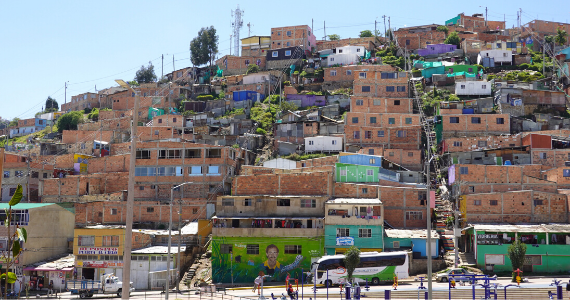TransMiCable - Bogota, Colombia
Urban Transformations and Health: The case of TransMiCable in Bogotá
Study Results:
Study Results during COVID-19:
Transportation and Inequality in Bogotá
Colombia has urbanized rapidly since the late 1950’s. Today, the city of Bogotá is home to 7.2 million people and has the second highest level of income inequality in the country. As rural populations have relocated to the city, income inequality has forced marginalized populations to settle on the outskirts of the city, often on steep hillsides in informal settlements without access to public services such as efficient mass transit.
Following intense social mobilization and advocacy by the local community, Ciudad Bolívar, an administrative area of Bogotá and emblematic of city peripheries in Latin America, was prioritized by the city government to receive a new mass transit intervention.
This new cable car service, TransMiCable, which launched in December 2018, allows for easy travel up and down the steep hillsides of Ciudad Bolívar, connecting the area to the city’s bus rapid transit system (TransMilenio), and lessens residents’ travel time by up to 80%. The cable car was accompanied by a broader urban development program, which included the installation and implementation of a variety of other community facilities and social projects.
The SALURBAL Study
A team of researchers at the University of the Andes is studying TransMiCable’s impact on the health of residents of Ciudad Bolívar. The evaluation has involved data collection from residents of Ciudad Bolívar residents of another community (San Cristóbal) that does not have a cable car, both before and after the installation of TransMiCable.
The research team is measuring:
- Environmental and social determinants of health: Air pollution inhaled by commuters using various transit options, including TransMiCable; physical environment perceptions; access to recreational and cultural facilities; transport accessibility; employment; social capital; and leisure time
- Physical activity: Leisure and transport-related physical activity
- Health outcomes: Health-related quality of life, respiratory diseases, homicides
To date, the study has completed two waves of data collection, in October-November 2018 and again October-November 2019, with more than 2,000 households participating and a 80% follow-up rate.
Data was collected using questionnaires, aerosol and other air quality monitors, satellite data, systematic observation, travel diaries, accelerometers, fare card data, and special apps designed to characterize mobility patters.
This project will contribute evidence regarding the health impact of a novel urban transportation system in order to support the design of future urban initiatives to promote sustainable transportation and health.
Study Timeline


Partnerships and Collaborators
Community Members
The communities of Ciudad Bolívar and San Cristóbal have been vital partners in the SALURBAL study. Researchers have held multiple meetings with community leaders and members throughout different phases of the study.
Community leaders and members have helped guide research questions and allowed researchers entry to the communities to conduct this research and supported the entire data collection process. Through citizen science, researchers have worked directly with community members to understand their perspectives and opinions about their communities and, among residents of Ciudad Bolívar, their opinions about the installation of TransMiCable.
Academia, Government, Civil Society
The conceptual framework for this study was designed through a participatory and multi-sectoral approach. A workshop held in 2018 with 31 stakeholders from nine organizations informed the development and validation of the framework.
Participants in this workshop came from academia (Universidad de Los Andes and Universidad de Ibagué), the public sector (the National Institute of Health; Bogotá’s Secretariats of Health, Habitat, Women, and Social Integration; the Institute of Sports and Recreation of Bogotá; TransMilenio S.A, [the managing and coordinating entity of the public transportation system of Bogotá, including TransMiCable]); and civil society (two community leaders from Ciudad Bolívar).
Colleagues from Universidad Nacional in Bogotá, Universidad de Antioquia in Medellín, Universidad del Norte in Barranquilla and UC Berkeley have contributed to the development of instruments and analytical approaches during all the process.

Learn more
Publication: Urban Transformations and Health: Methods for TrUST--a Natural Experiment Evaluating the Impacts of a Mass Transit Cable Car in Bogotá, Colombia
Publication: User expectations and perceptions towards new public transport infrastructure: evaluating a cable car in Bogotá
Publication: Lifting urban mobility for the poor: Cable-cars, travel satisfaction and subjective well-being
Publication: The Impacts of an Urban Cable Car System on Liveability: A Mixed Methods Study in Bogotá, Colombia
Publication: Commuter's personal exposure to air pollutants after the implementation of a cable car for public transport: Results of the natural experiment TrUST
Publication: Effects of an urban cable car intervention on physical activity: the TrUST natural experiment in Bogotá, Colombia
Publication: Evaluating the effects of social capital on travel behavior: Modeling the choice of an innovative transport mode
Publication: Urban transformations, community participation, and health: inter-sectoral and cross-country learning experience between Brazil, Chile, and Colombia
Publication: Winds of change: the case of TransMiCable, a community-engaged transport intervention improving equity and health in Bogotá, Colombia
Policy Brief: Health in All Urban Policies: Lessons from Latin American Cities
Policy Brief: Planning Health Evaluations of Housing and Neighborhood Interventions: Lessons from Latin America
Policy Brief: Sustainable Transport and Urban Health: Lessons from Latin America
SALURBlog: TRansformaciones Urbanas Y Salud: El Caso De TransMiCable En Bogotá (TRUST) - Uno De Los Estudios Evaluados En SALURBAL
SALURBlog: Globally and locally, our cities need urban transport policies that impact health and equity.
Video: Presentation from Dr. Olga Lucia Sarmiento on the TransMiCable evaluation at the 2019 Planetary Health Annual Meeting (YouTube)
Web: EpiAndes